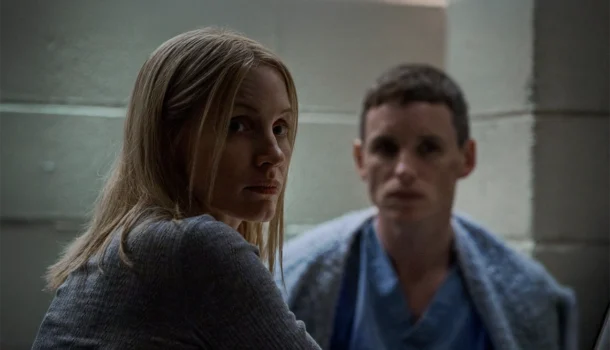When the curtain of an ordinary night tears open to reveal the horror hidden within the entrails of hospital routine, “The Good Nurse” hints at a disturbance that goes beyond crime: it exposes the silent complicity of institutions that chose to ignore the threat in favor of convenience. In his first English-language project, Tobias Lindholm — a central figure in contemporary Danish cinema and known for his collaborations with Thomas Vinterberg in dense narratives such as “Another Round” and “The Hunt” — transcends a simple adaptation of Charles Graeber’s book, crafting a meticulous thriller that slowly poisons the viewer with the same lethal coldness embodied by its protagonist. Eddie Redmayne, an Academy Award winner once again in the spotlight, shapes a character whose banal everyday demeanor becomes the perfect disguise for the inconceivable.
The film unravels the trajectory of Charlie Cullen, whose nursing career spanned a dozen American hospitals, all connected by the same failure: silence. Without ever triggering formal alarms, Cullen was transferred from institution to institution, leaving behind an invisible trail of deaths — numbers that likely surpass four hundred cases. His weapons were as discreet as his presence: lethal doses of insulin and digoxin, surreptitiously administered into IV bags destined for vulnerable patients. The narrative examines not only the killer himself but also the structure that shielded him, showing how corporate interests repeatedly triumphed over moral duty, perpetuating a chain of omissions as deadly as the crimes themselves.
The film’s oppressive atmosphere, constructed through cold and spectral cinematography, acts as a mirror to the ethical void permeating the story. Jessica Chastain, in flawless harmony with Redmayne, delivers a performance of contained yet devastating tension, becoming the beating heart of the resistance that ultimately breaks the cycle of impunity. Her character, Amy Loughren, emerges as a spark of lucidity in an environment numbed by inertia. In a pivotal scene, upon finding Cullen alone with her daughters, she treads the fragile line between courage and terror, staging a desperate semblance of normalcy that holds the audience’s breath until the inevitable emotional collapse that follows.
Rather than resorting to graphic violence, Lindholm inscribes evil into the small gestures, into the accumulation of overlooked decisions, into the unspoken pacts to ignore the unacceptable. In this way, “The Good Nurse” distances itself from conventional thrillers to inhabit a more disturbing territory: that of questioning the diffuse responsibility within systems that choose to protect their reputation over saving lives. The unease the film sows does not dissipate with the closure of Cullen’s story; on the contrary, it echoes persistently, warning of the countless faces of complacency.
Though Charlie Cullen was ultimately sentenced to an eternity behind bars, the unease his path sowed persists in every environment where transparency is sacrificed for convenience. The major question the film instills — without ever stating it aloud — is disarmingly simple: how many others, sheltered by fragile or indifferent systems, continue today to act under the same veil of invisibility?
Film: The Good Nurse
Director: Tobias Lindholm
Year: 2022
Genre: Thriller
Rating: 10/10

